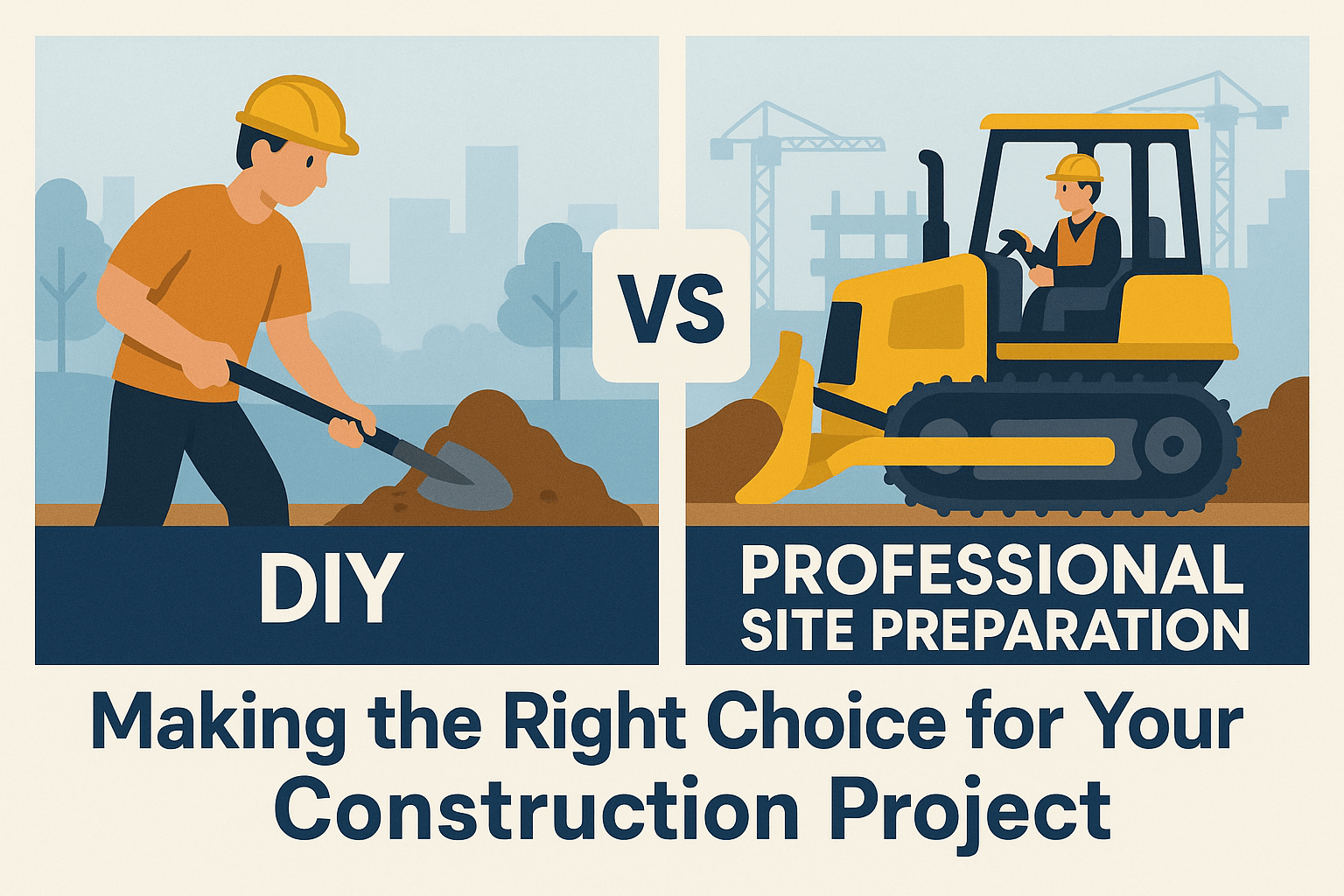Property owners face a critical decision when embarking on construction projects: whether to handle ground preparation independently or hire experienced contractors. The success of any building project depends heavily on proper foundation work, making this choice particularly significant. Professional site preparation services offer expertise and specialized equipment, while DIY approaches can provide cost savings and personal satisfaction. Understanding the advantages and limitations of each option helps property owners make informed decisions that align with their project scope, budget, and timeline.
Understanding the Scope of Site Preparation Work
Site preparation encompasses numerous complex tasks that extend far beyond simple excavation. The process involves soil analysis, grading, drainage planning, utility marking, and environmental considerations. Each element requires specific knowledge and tools to execute properly. Professional contractors typically possess years of experience handling various soil conditions, weather challenges, and regulatory requirements. They understand how different soil types behave under various conditions and can anticipate potential complications before they become costly problems.
DIY enthusiasts often underestimate the complexity involved in land preparation projects. What appears straightforward on the surface frequently involves intricate planning and execution. Proper site evaluation requires understanding soil composition, drainage patterns, and local building codes. Inadequate preparation can lead to foundation issues, drainage problems, and structural complications that cost significantly more to address after construction begins.
Cost Analysis: DIY vs Professional Services
Budget considerations play a major role in the decision-making process for most property owners. DIY site preparation eliminates labor costs, which typically represent 60-70% of professional service fees. Equipment rental costs remain unavoidable, but savvy homeowners can often secure better daily rates than contractors pay for long-term rentals. Material costs stay relatively consistent regardless of who performs the work.
Professional services include several cost components that DIY approaches avoid:
- Labor fees for experienced operators
- Equipment transportation and setup costs
- Insurance and bonding expenses
- Overhead and profit margins
- Project management and supervision
However, professional contractors often secure better pricing on materials due to established supplier relationships and bulk purchasing power. They also complete projects faster, reducing overall equipment rental periods. Insurance coverage protects against accidents and property damage, which individual homeowners must consider when weighing total project costs.
Professional site preparation typically costs between $2,500 and $8,000 for residential projects, depending on lot size and complexity. DIY approaches can reduce these costs by 40-60%, but require significant time investment and carry higher risk of mistakes. Correcting errors after improper preparation often exceeds the original savings, making professional services more economical in many situations.
Equipment and Tool Requirements
Successful site preparation demands specialized equipment that most homeowners don’t possess. Professional contractors maintain fleets of machinery designed for specific tasks, ensuring optimal performance and efficiency. Their equipment undergoes regular maintenance and calibration, reducing breakdown risks during critical project phases. Operators receive extensive training on safety protocols and equipment operation, minimizing accident potential.
DIY projects require careful equipment selection and rental planning. Essential machinery includes:
- Excavators for digging and material movement
- Bulldozers for large-scale grading operations
- Compactors for soil stabilization
- Graders for precise surface leveling
- Trenching equipment for utility installation
Rental costs vary significantly based on equipment size, rental duration, and local market conditions. Daily rates for basic excavators range from $300 to $600, while larger bulldozers can cost $800 to $1,500 per day. Transportation fees add $200 to $500 to total costs, depending on distance and equipment size.
Operating heavy machinery requires skill and experience that develop over time. Inexperienced operators risk equipment damage, property destruction, and personal injury. Professional operators understand equipment limitations, optimal operating conditions, and safety procedures that prevent accidents. They also recognize when soil conditions or weather make operation unsafe or ineffective.
Safety Considerations and Risk Management
Construction site safety represents a critical factor that often tips the decision toward professional services. Heavy equipment operation involves significant risks, including tip-over accidents, underground utility strikes, and pedestrian injuries. Professional contractors carry comprehensive insurance coverage and implement safety protocols developed through industry experience. Their workers receive regular safety training and understand proper procedures for various situations.
DIY operators face several safety challenges that professionals handle routinely. Underground utility location requires specialized equipment and training to avoid dangerous strikes. Gas line hits can cause explosions, while electrical line contact can result in electrocution. Water line breaks create flooding and property damage, while telecommunications cable cuts disrupt services and incur repair costs.
Weather conditions significantly impact site preparation safety and effectiveness. Professionals understand when conditions make work unsafe or ineffective, adjusting schedules accordingly. They recognize soil moisture levels that affect stability and compaction, preventing future settlement issues. Rain, snow, and extreme temperatures create hazardous operating conditions that inexperienced operators may not recognize.
Regulatory Compliance and Permit Requirements
Local building codes and environmental regulations add complexity to site preparation projects. Professional contractors maintain current knowledge of applicable requirements and secure necessary permits before beginning work. They understand setback requirements, drainage regulations, and environmental protection measures that affect project planning. Violation of these requirements can result in work stoppages, fines, and costly corrections.
Permit requirements vary significantly between jurisdictions and project types. Common permits include:
- Excavation permits for projects exceeding specific depths
- Environmental permits for work near wetlands or protected areas
- Stormwater management permits for drainage modifications
- Tree removal permits in protected zones
- Utility connection permits for service installations
Professional contractors typically handle permit applications as part of their service packages. They understand application procedures, required documentation, and approval timelines. Their established relationships with local officials often expedite approval processes, reducing project delays.
DIY property owners must navigate permit requirements independently, which can prove challenging without construction experience. Permit applications require detailed site plans, engineering calculations, and environmental assessments that may exceed individual capabilities. Incorrect applications result in delays, additional costs, and potential legal complications.
Making the Final Decision
The choice between DIY and professional site preparation depends on multiple factors that vary by project and property owner. Small projects with minimal complexity may suit DIY approaches, while larger developments typically benefit from professional expertise. Property owners should honestly assess their capabilities, available time, and risk tolerance before making decisions.
Professional services make sense for complex projects, tight timelines, or situations involving significant liability exposure. The expertise, equipment, and insurance coverage they provide often justify higher costs through reduced risk and improved outcomes. DIY approaches work best for simple projects where property owners possess relevant skills and adequate time for completion.

Chase Ortiz is part of the team at PaigeSimple, where he takes care of all the advertising requests. With a sharp eye for detail, Chase makes sure every advertising opportunity is handled smoothly, helping the site grow and reach more people. His ability to manage these tasks efficiently makes him an important part of the team.

